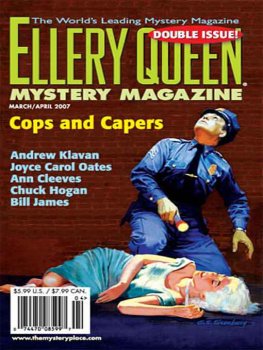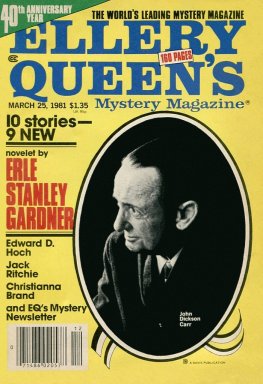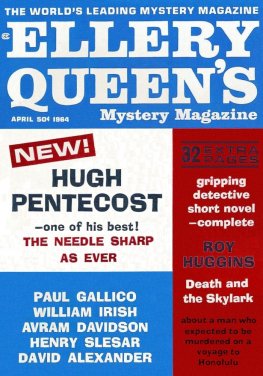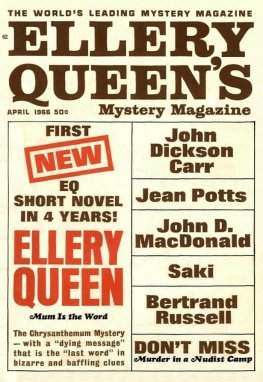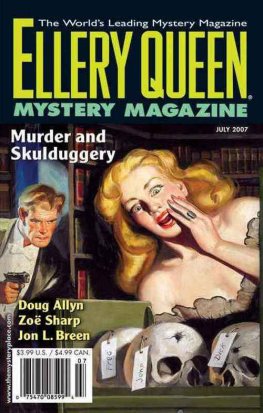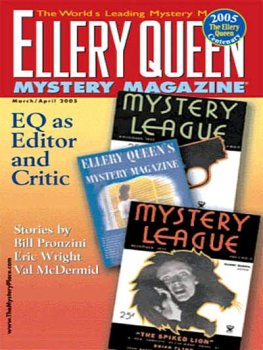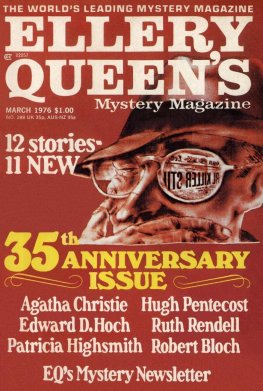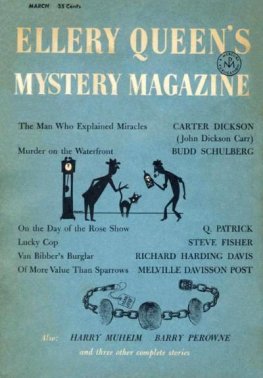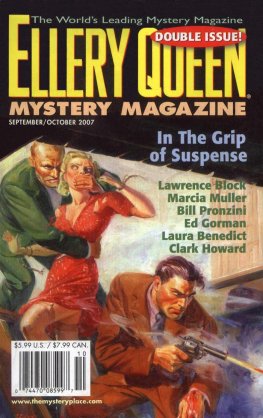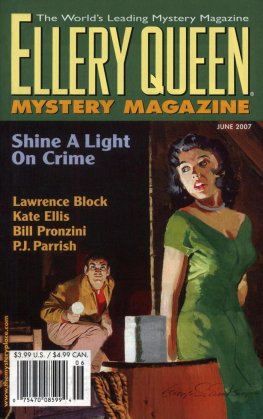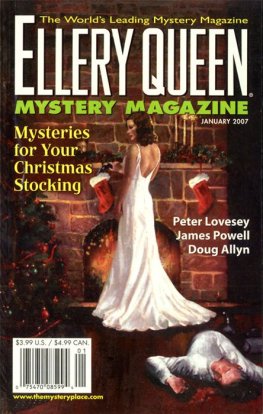Barbara Callahan - Ellery Queen’s Mystery Magazine. Vol. 129, Nos. 3 & 4. Whole Nos. 787 & 788, March/April 2007
Here you can read online Barbara Callahan - Ellery Queen’s Mystery Magazine. Vol. 129, Nos. 3 & 4. Whole Nos. 787 & 788, March/April 2007 full text of the book (entire story) in english for free. Download pdf and epub, get meaning, cover and reviews about this ebook. City: New York, year: 2007, publisher: Dell Magazines, genre: Detective and thriller. Description of the work, (preface) as well as reviews are available. Best literature library LitArk.com created for fans of good reading and offers a wide selection of genres:
Romance novel
Science fiction
Adventure
Detective
Science
History
Home and family
Prose
Art
Politics
Computer
Non-fiction
Religion
Business
Children
Humor
Choose a favorite category and find really read worthwhile books. Enjoy immersion in the world of imagination, feel the emotions of the characters or learn something new for yourself, make an fascinating discovery.
- Book:Ellery Queen’s Mystery Magazine. Vol. 129, Nos. 3 & 4. Whole Nos. 787 & 788, March/April 2007
- Author:
- Publisher:Dell Magazines
- Genre:
- Year:2007
- City:New York
- ISBN:0013-6328
- Rating:3 / 5
- Favourites:Add to favourites
- Your mark:
- 60
- 1
- 2
- 3
- 4
- 5
Ellery Queen’s Mystery Magazine. Vol. 129, Nos. 3 & 4. Whole Nos. 787 & 788, March/April 2007: summary, description and annotation
We offer to read an annotation, description, summary or preface (depends on what the author of the book "Ellery Queen’s Mystery Magazine. Vol. 129, Nos. 3 & 4. Whole Nos. 787 & 788, March/April 2007" wrote himself). If you haven't found the necessary information about the book — write in the comments, we will try to find it.
Ellery Queen’s Mystery Magazine. Vol. 129, Nos. 3 & 4. Whole Nos. 787 & 788, March/April 2007 — read online for free the complete book (whole text) full work
Below is the text of the book, divided by pages. System saving the place of the last page read, allows you to conveniently read the book "Ellery Queen’s Mystery Magazine. Vol. 129, Nos. 3 & 4. Whole Nos. 787 & 788, March/April 2007" online for free, without having to search again every time where you left off. Put a bookmark, and you can go to the page where you finished reading at any time.
Font size:
Interval:
Bookmark:
Ellery Queens Mystery Magazine. Vol. 129, Nos. 3 & 4. Whole Nos. 787 & 788, March/April 2007
Going Back
by Ann Cleeves
Copyright 2007 by Ann Cleeves

Art by Allen Davis
Winner of the 2006 Duncan Lawrie Dagger for her novel Raven Black (Macmillan), Ann Cleeves works with libraries developing services for readers. The Dagger judges said of her winning book: Superb sense of place. A depiction of an enclosed community with modern and entrenched values constantly competing. A thrilling read. Her new book: Hidden Depths.
Susan had thought she would recognise the place immediately. The pictures in her head were solid and precise. She revisited them regularly, saw them like photos. The grey line of houses surrounded by grey hills. The school playground only separated from fields by a low stone wall, so the wind blowing across it chapped their lips and turned their fingers blue. The tubular steel climbing frame where shed hung from her knees, her skirt falling over her upper body and the three girls in the corner of the yard sniggering and pointing, shouting at the boys to look. We can see your knickers! We can see your knickers! The chimney-shaped stove in the junior classroom, which the caretaker filled with coke and which belched out sulphur-tasting fumes. Her mothers mouth crimped in disapproval.
But everything was different. The village had become a fashionable place to live, within easy commuting distance of Leeds. You could tell that rich people lived here. The school had been converted into a picture from a glossy magazine. Through plate-glass windows you could see a pale wood mezzanine floor and exposed beams. Susan wondered if there was any chance of seeing inside, of smelling the wood and touching the heavy fabric of the curtains. Changes to the School House, where shed lived, were more modest, but the lines of the severe square box had been softened by a conservatory and hanging baskets. In her memory she saw the house through drizzle and fog. Her mothers resentment at being forced to live there had imposed its own microclimate. Today there was the pale, lemon sunshine of early spring.
And she was back. A fiftieth birthday present to herself. What did they call it? Exorcising ghosts.
So she stood for a moment trying to find her bearings. She sensed Toms impatience, but this was her time. Let him wait. She stared fiercely down the road, then closed her eyes and laid the pattern of houses over the landscape of her memory.
Theyve widened the lane, she said. The verge was deeper then.
He kept quiet. He knew it was important not to say the wrong thing.
When theyd moved here from Leeds, her mother had called it a cultural desert. It had been her fathers first headship and hed had no real choice in the matter. He hadnt fitted in at his previous school and had been told by the director of education to apply. He had no vocation for teaching. In the war hed been happy, had hoped the fighting would go on forever. Afterwards, what could he do? The government needed teachers and would pay him to train.
Her mother had met him when he was a mature student and had rather liked the idea of marrying a teacher. It was a respectable profession. Perhaps she pictured him in a gown taking assembly in an oak-panelled hall. Susan thought she couldnt have been aware then of the reality the poor pay, the grubby children who wet their pants and carried nits. Her father didnt have the academic qualification to teach in a grammar school. He was reduced to drilling the times tables into the heads of bored seven-year-olds, to supervising the half-dressed prancing to Music and Movement on the wireless. It was no job, he said, for a grown man.
And this, he had to admit, was no real headship. There were only thirty children, fifteen infants and fifteen juniors. He took the juniors in one classroom and Miss Pritchard took the infants in the other. Susans mother never liked Miss Pritchard, who was plump, comfortable, and vacuous. She liked nothing about the village at all. All she could think of was moving back to the city.
The house was always cold. Even in summer the damp in the walls and the floor seeped into your bones. The wind blew over the Pennines and under the doors. Susan remembered the building in black and white, like the fuzzy pictures on the television in the corner of the front room. Her parents sat every evening in silence watching television, surrounded by their utility furniture, the few good pieces of china her mother had inherited from a well-off aunt, an inscribed tankard which had been given to her father when he left his last school. And always, sometimes even drowning out the voices on the TV, there was the sound of the sheep on the hill. Like a baby crying in the distance.
Susan had escaped outside, to ride her bike down the lane and play on the climbing frame in the schoolyard. Always on her own. Nobody wanted to be friends with the teachers lass. They were frightened shed tell on them. She saw them sometimes, the other girls, Heather and Diane and Marilyn, sitting on the pavement outside the council houses down the hill, their heads together over some game. She never went to join them. She knew she wouldnt be welcome and besides, her mother didnt like her mixing. But she watched them. She always knew what they were up to.
She had been so strong then, so easy in her body. Shed walked miles across the hills. Thered been handstands against the wall, reckless slides across ice on the playground, cartwheels. Her mother hadnt approved. If she saw her daughter on the climbing frame shed rap on the kitchen window to call her into the house.
Whats the matter? Susan knew how to play the innocent. Shed had to learn.
Behaving like that. Showing your underwear to that boy. The boy was Eddie Black, a slow, gentle fifteen-year-old who lived in the cottage next to the school. He spent much of his time in the garden, in a wire mesh aviary, caring for his birds.
Susan wondered why that was so wrong. Why was that different from doing Music and Movement in front of her father? Or his coming into her bedroom when she was dressing? But she said nothing. She knew it was impossible to argue with her mother when her mouth was stretched in that thin-lipped way. When the sherry bottle was uncorked on the kitchen table and the first glass was already empty.
One evening stuck in her memory. It had been just before Easter and her mother had gone into Leeds to a concert. The Messiah. Shed driven herself in the black Morris Minor. An adventure, but an ordeal. Shed never enjoyed driving. When she returned she was a different woman. Susan thought, if shed bumped into her in the street, she wouldnt have recognised her, the colour in her cheeks, the way she stood. It was like coming back to the village today and not recognising it. Susan had sat on the stairs wrapped up in the candlewick dressing gown listening to her mothers voice.
Lets move, Philip. Please can we move back? A fresh start.
She hadnt heard her fathers answer, but the next day nothing had changed and the move was never mentioned again. She couldnt tell if anything was different between them.
And me? Susan wondered. What was I feeling in this house I dont know anymore? Nothing. I crept around on the edge of their lives, frozen and silent, trying above all not to make things worse. In school it was the same. Making myself invisible so they wouldnt poke and pinch and jeer. I only felt alive when I was outside, when I was running or climbing. Or watching.
Well? Tom asked, breaking into her memories.
The gate into the fields in the same place.
Font size:
Interval:
Bookmark:
Similar books «Ellery Queen’s Mystery Magazine. Vol. 129, Nos. 3 & 4. Whole Nos. 787 & 788, March/April 2007»
Look at similar books to Ellery Queen’s Mystery Magazine. Vol. 129, Nos. 3 & 4. Whole Nos. 787 & 788, March/April 2007. We have selected literature similar in name and meaning in the hope of providing readers with more options to find new, interesting, not yet read works.
Discussion, reviews of the book Ellery Queen’s Mystery Magazine. Vol. 129, Nos. 3 & 4. Whole Nos. 787 & 788, March/April 2007 and just readers' own opinions. Leave your comments, write what you think about the work, its meaning or the main characters. Specify what exactly you liked and what you didn't like, and why you think so.

